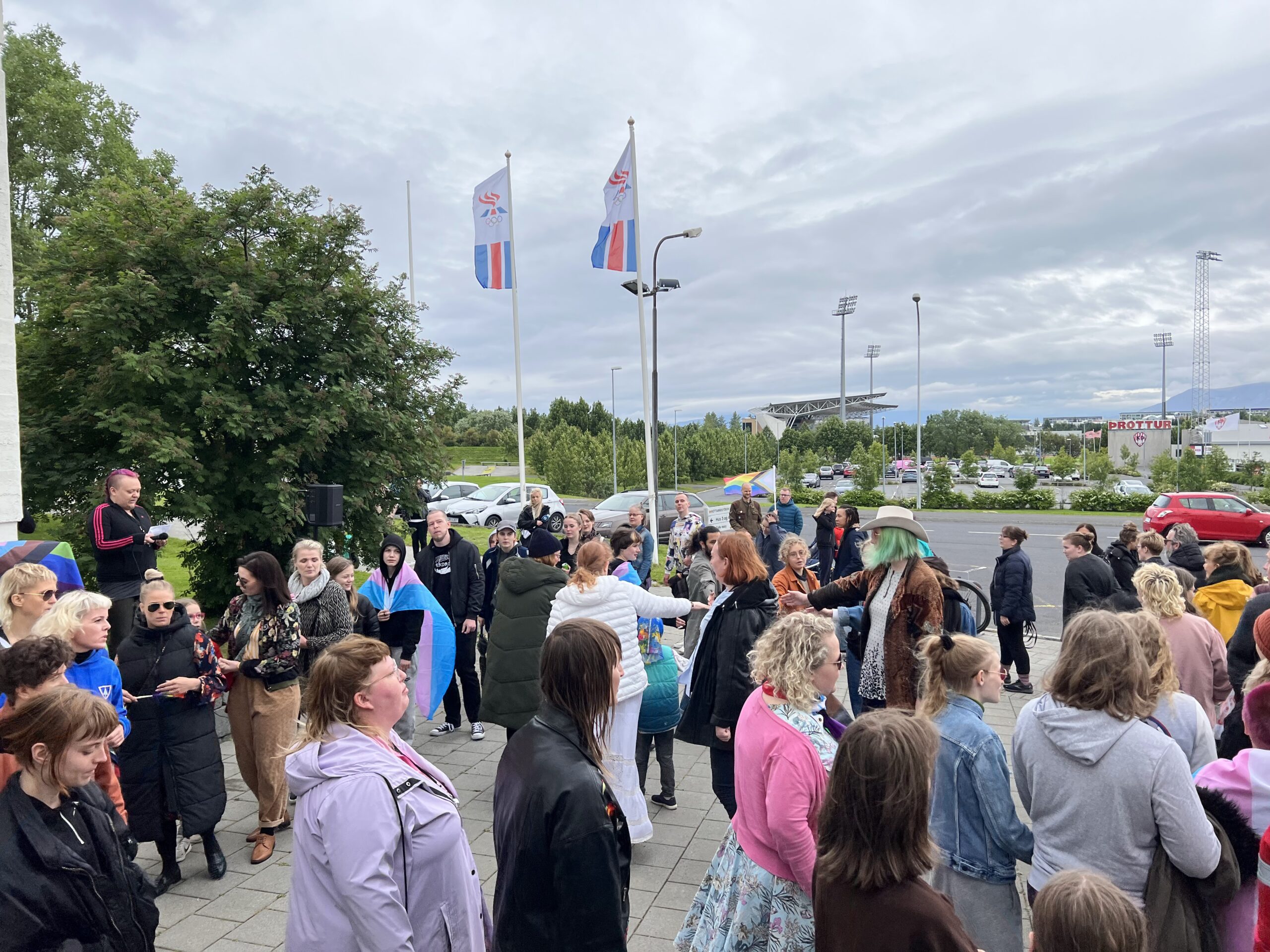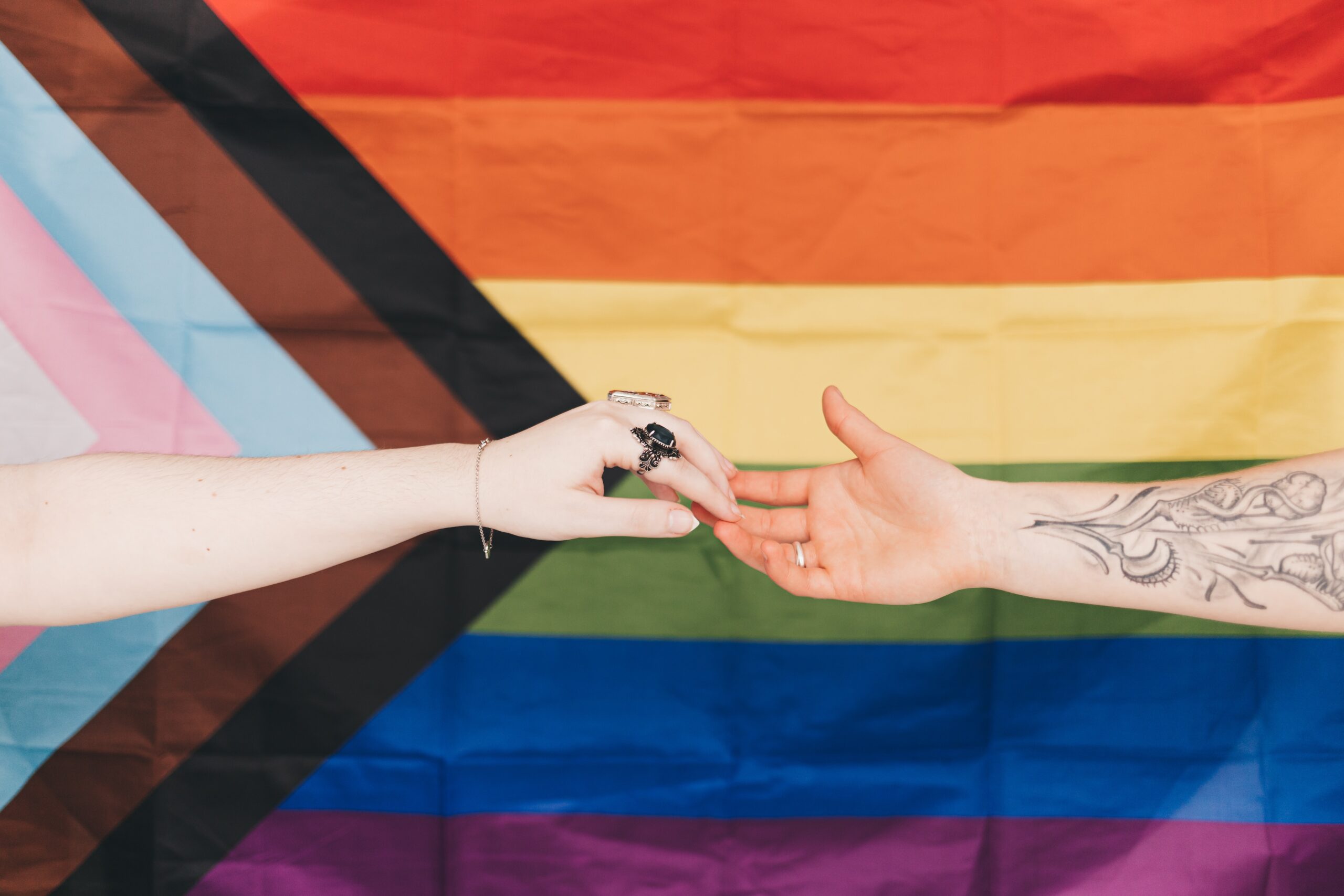With increased visibility trans community in Iceland faces backlash.
The trans community in Iceland says they are facing blatant discrimination and transphobia following a decision by the Icelandic Swimming Association (Sundsamband Íslands, SSÍ) to forbid trans women from competing in elite swimming competitions. SSÍ voted to uphold the decision made by FINA, the world governing body for swimming, that states transgender women cannot compete in elite women’s competitions if they’ve experienced any part of male puberty. The ruling, which has been widely criticized, could have been voted against by the Icelandic federation at the world championships in Budapest.
After criticisms were made and a proposal for changes was presented to SSÍ by fifteen queer and feminist organizations SSÍ decided to double down and uphold their decision. GayIcelands’s Michael Ryan listened to protestors and members of the trans community and the non-binary community who say the ban is only a part of a bigger problem.
“This is just bullshit”
“We all know this is utter bullshit,” said Viima Lampinen, chair of Trans Ísland, at the protest outside ÍSÍ (the National Olympic and Sports Association of Iceland) headquarters. “I shouldn’t say this as the chair of Trans Ísland but this is what it is, this is just bullshit. We are never going to back down. This decision was clearly nothing but wrong, based on hate or misinformation, and therefore we will not stop campaigning against it.”
The largest critique levied at SSÍ is that no experts or specialists were consulted before they made the decision to uphold these rules. “I think the International Swimming Federation has gone too far and I don’t think these people really understood what they were doing,” says Viima. “Those who have expertise in the matter were not consulted before this decision was made.”
Viima has been the most vocal advocate for trans rights as of late and argues quite plainly that the science these decisions are made on is questionable. In a chat with newspaper Fréttabladid Viima explained there are no definitive definitions of what exactly a man or a woman is.
“The variability is so great that science cannot give a complete answer. According to Western beliefs, there are only two categories, women and men, and in sports, this definition is very crucial. As a result, there are easily all kinds of debates about gender and gender in sports that are not based on biology, but on the idea of dividing people into two categories. However, this division is not justified when biology is examined in more detail.”
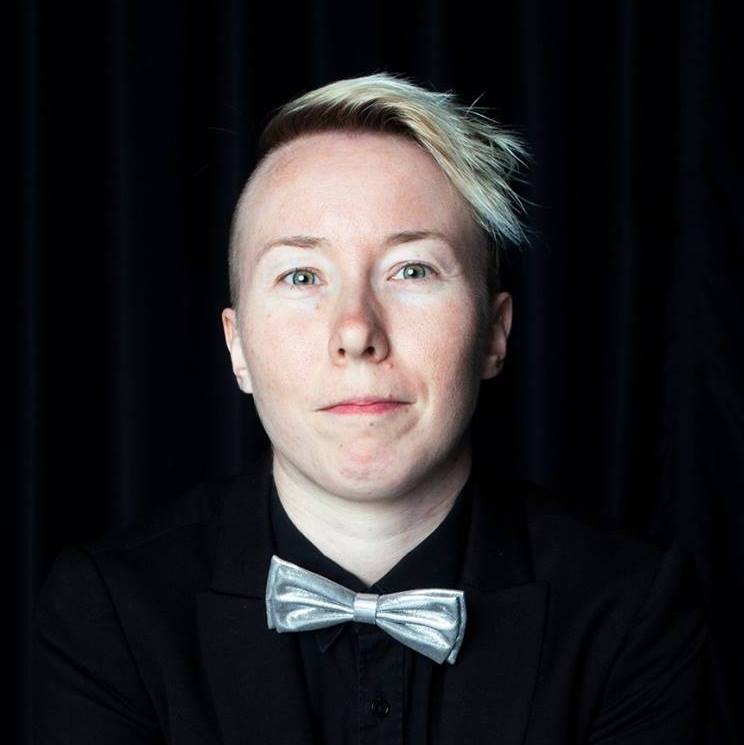
Continuing the same line of questioning Viima asked at the protest “What is “male,” what is “puberty,” and what are they even talking about?”
“Before the age of 12? What? Why?” Sarcastically they rebutted by saying: “There must be some scientists we can check with that have figured out all of human biology!”
Great diversity in human bodies
Viima says that when SSÍ took an open stance against trans women what they really did was show that they are motivated by hate or ignorance. They do not understand sports or human bodies.
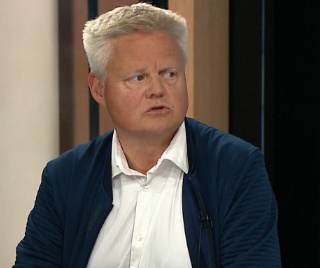
Online Viima went on to post a link to research on the evolution of genitals which shows that there’s great diversity in the way our bits and bobs are put together. Viima concluded there’s too much diversity within the human race to be classifying people into two simple boxes.
“For example, I looked at the statistics for competitors at the 2016 Olympics, where the smallest woman competing was 133 cm tall, while the tallest was over two meters tall. The variability is so great. It is absurd to say that trans women are always going to have an advantage in all sports. It’s just about setting rules for women, hatred of trans women, and not wanting to see them succeed. If we also look at high-achieving athletes like Ian Thorpe, who won five gold medals in swimming at the Olympics, he has such a big leg that he is in the Guinness Book of World Records. However, there are no rules about how big of a foot swimmers can have, as high-performance sports are about finding outstanding people,” says Viima. “But when it comes to trans people, rules are set to prevent them from working.”
“I think the International Swimming Federation has gone too far and I don’t think these people really understood what they were doing.”
Viima says all of this talk about trans women in sports erases the conversation about discrimination and exclusion.
“Sport is about finding the most exceptional, remarkable human being. Anyone that watches sports has competed in sports or is an athlete knows that it’s not just the physical attributes that win the god damn game. Are you kidding me? You can have the tallest man on your basketball team, but you still won’t win a men’s Olympic gold,” says Viima. Then when trans people are included in the competition they’re considered to have a super-human advantage.
Viima continues. “Sport is so much more than physical characteristics but then all of a sudden when we get to trans and non-binary people we have a reason for discrimination. And now we’re super humans! I mean, it’s just ridiculous.”

Did ÍSÍ learn nothing from their work with Samtökin?
Mars M. Proppé, treasurer and educator for Samtökin ‘78, attended the protest outside of ÍSÍ’s headquarters. The Icelandic Swimming Association didn’t consult with Samtökin ‘78 before their vote either, despite the fact that the ÍSÍ has worked with Samtökin in the past and has an agreement with them to work on diversity, equity, and inclusion. In comments to GayIceland Mars noted it was very surprising to them that this decision was made to vote in this way at the board of SSÍ because Samtökin and ÍSÍ have been working together for a long time and it’s been a really good collaborative working relationship they’ve been doing.
“It’s sad to know and to see that the work has not trickled through the whole organization, clearly.”
The fact that neither ÍSÍ nor SSÍ reached out to Samtökin prior to the vote seems to show that when it matters most, the relationship they have for improving queer rights in sports is irrelevant.
A scapegoat for these organizations not confronting their transphobia
Alda Örlygur Villiljós a member of trans activist organization Argafas agrees. Alda was one of the first people to organize the protest outside ÍSÍ, write the letter of demands to the board, and rally 15 different queer and feminist organizations behind the cause. In Alda’s eyes, this is all just scapegoating.
“I just really hope that they will listen because like we’ve talked about today this decision is based on false science and prejudice. It’s trying to take the focus away from the people who are really making trouble. The same type of people who are making abortion inaccessible and making all of these decisions at the higher levels of society that are actually coming down all women and all men and all queer people and people in general. It’s definitely not trans people that are the problem, we are just being scapegoated at this time when we see so many rights being chipped away across the board. We’re being made into this scapegoat when it’s really not us who are the problem. But we’re easier to target,” says Alda.
This scapegoating is just the tip of the iceberg according to trans activists like Alda, who mention that if rules are written about who’s gone through male puberty and who hasn’t, things will get very dicey.
“They want to shy the attention away from themselves so people don’t come for them and their power. It’s important just to make noise and be seen, to say that we’re not going to just accept this or hope that it goes away somehow because what’s next? Next they’re going to come for who? Women that look a little bit butch? Men who are too feminine?”
Another thing Alda points out is the pockets of hate and ignorance online. Even in Iceland, the image of the country being a queer utopia falls to pieces when it comes to Icelanders in the comment section.
“They’ll eventually come for everybody because there are deep caves of transphobia and terfism online,” says Alda. “People are just spotting and questioning if all celebrities are trans. They post pictures and question like “look at this actress! Her shoulders are too wide!” They’re just trying to spot trans people and they’re seeing them everywhere because there’s so much diversity in human beings and the way we’re built that nobody looks like a perfect cis person.”

Are trans people safe in Iceland anymore?
Žarko Urošević, an activist and a member of Argafas agrees with Alda. “This is not a surprise. There are a lot of anti-trans movements going on in the world and this is just one of the things happening. We need to show up and stand together and say something and not just let things slide. So that’s why we’re organized here today,” says Žarko. “This has nothing to do with sports, this has nothing to do with science, this is just plain transphobia. That’s what it is. It’s trans-misogyny in its worst shape and form. They will try to get rid of trans women in any way they can and we are not going to let that happen. So we need to fight. We need to stand up.”
“This has nothing to do with sports, this has nothing to do with science, this is just plain transphobia. That’s what it is. It’s trans-misogyny in its worst shape and form.”
As an immigrant in Iceland Žarko also sees the fading appeal of Iceland as the “queer feminist utopia” it’s often painted to be. “To hear that this decision has come from an Icelandic organization, it’s unacceptable. I don’t know if trans people that live in Iceland feel safe anymore. I don’t know if we feel accepted and welcomed here.”
Trans people are still among the most marginalized
Logn Yndu, a member of the Red Umbrella activist organization for sex workers’ rights, agrees with Žarko.
In a speech to the crowd at the protest, Logn pointed out that “both here in Iceland and around the world trans women are killed every year by people who are killing them just for being trans. Trans women are not the problem, the problem is that they’re not accepted.”
Logn finished the short speech by calling everyone to protest again if no changes were made. “I won’t speak long but we’ll see you here for the next protest if SSÍ doesn’t make the changes themselves.” Other speakers demanded the same.
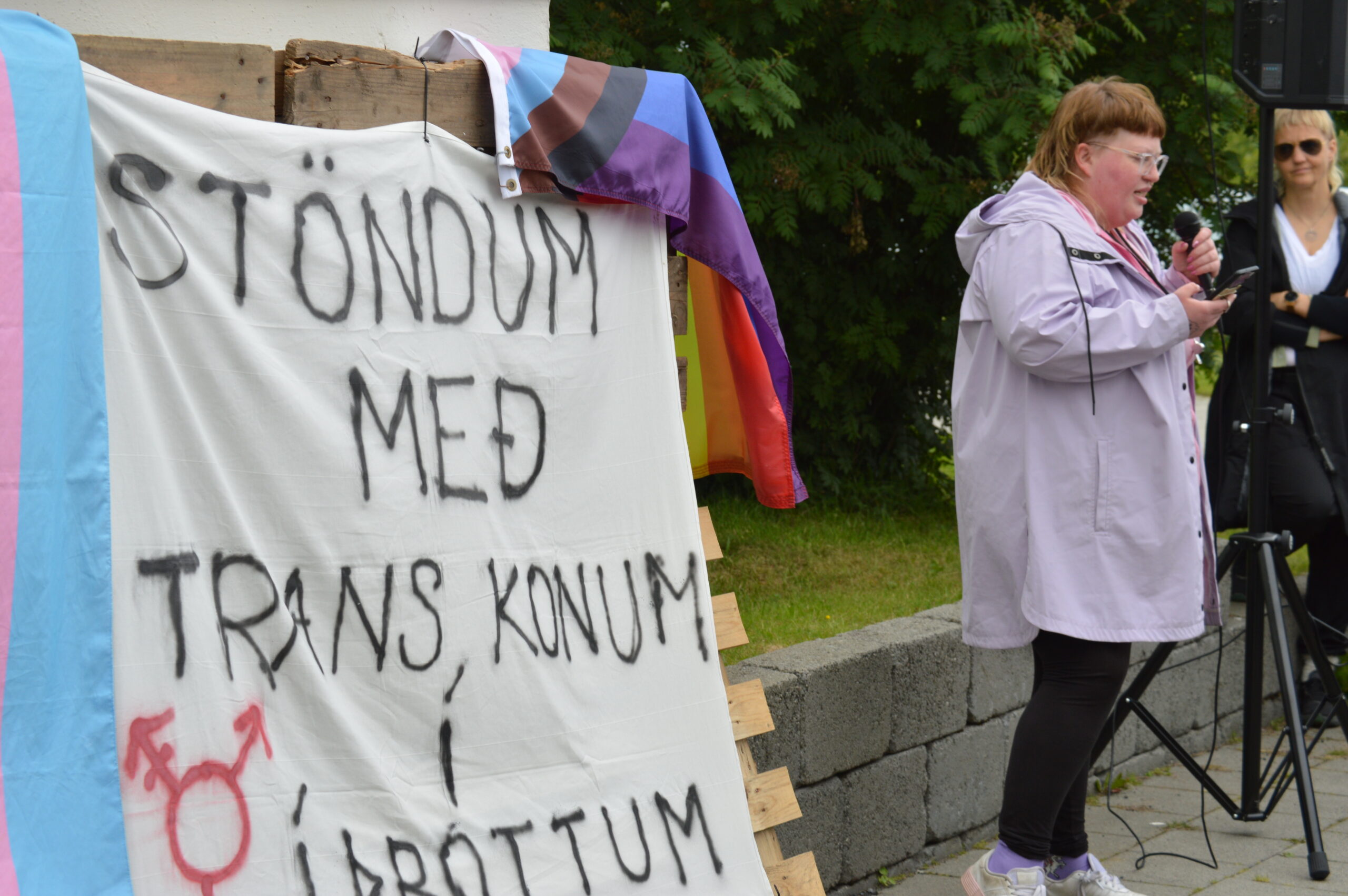
Why not give them their own lane?
In the conversation surrounding trans athletes are plenty of suggestions that trans, non-binary, and intersex people shouldn’t be allowed in either men’s or women’s sports, they should have a competition on their own. FINA, the International Swimming Federation, has talked about this option but hasn’t elaborated on how it would be created and what criteria certain people would have to meet. In response, Viima Lampinen says FINA is an embarrassingly uneducated sports organization.
“It is unexciting to register in a category where there will never be enough participants to create a real competition, in addition to which there is no respect, tradition or history attached to the category and that will never get show time on television,” says Viima. “So I just find it outrageous and unnecessary. All women, including trans women, should be allowed to compete in the women’s category. I would go so far as to say that such a party disregards sports and that people who create such a party do not understand what achievement sports are all about.”
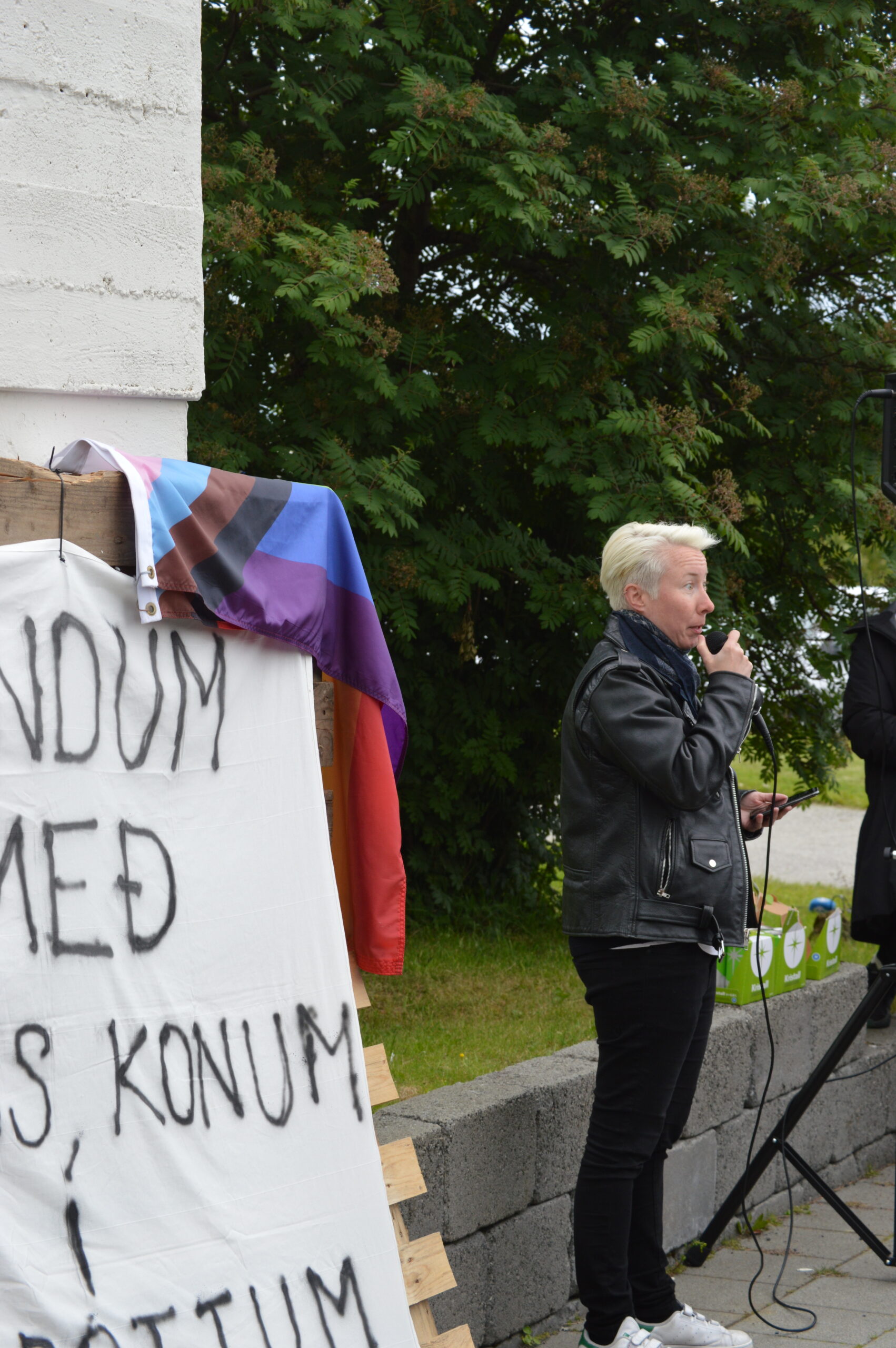
So what is the solution?
Alda Villiljós says the solution is simple, people in power need to educate themselves and think about these topics critically before making decisions.
“In general I think people need to be more critical in their thinking and looking at the information that we are taking in and believing. We need to not believe just anything people tell us or anything we read online. We need to just think critically and ask “where is this coming from?” “What is the agenda behind this?” “Why is this information being shown in this way?” “Who benefits from this?””
In Žarko eyes, organizations like SSÍ and ÍSÍ should consult the trans people before making decisions about them. Perhaps, a trans person should be on the board or in the room when a rule regarding trans people in sports is decided. “Maybe they’d have an easier time if they started thinking bottom up,” says Žarko. “Maybe if they listened to the people that are the most marginalized… these protests wouldn’t be happening if we were included in the first place. The policies should be made with us in mind instead of just based on arbitrary decisions.”
Negotiation or another protest?
With SSÍ’s decision to uphold their vote with FINA, there’s clear opposition to revisiting this topic. Following the protest and demands made by fifteen queer and feminist organizations, nothing has changed. So the question remains, how do trans rights move forward in Iceland from here?
Viima Lampinen, chair of Trans Ísland, says they’re at least willing to come to the table and that SSÍ’s decision can be atoned for. “We think this decision was a mistake, but we all make mistakes and they can be made up for.”
“We think this decision was a mistake, but we all make mistakes and they can be made up for.”
Mars Proppé, treasurer and educator for Samtökin ‘78, says that although SSÍ and ÍSÍ didn’t consult with Samtökin before the vote, the opportunity for reconciliation and more education is still on the table.
“It’s not a betrayal, the work we have been doing together has had an impact. It’s been really important and has affected the lives of many trans children in Iceland, especially in sports but it hasn’t gone deep enough in the organization,” says Mars. “Clearly, there’s still some work to be done in educating all factions of the sports movement to know that we’re not a threat. Just the opposite. We’re just one group of people trying to participate like all other people.”
Moving forward, Mars wants both organizations to come to the table to discuss these issues “I hope that before such decisions are made in the future that people will speak to us and learn. We have immense knowledge of these things. We’ve already had these talks with them. We’re still open to cooperation with them in the future instead of having to show up here and protest. I’ll do it again and again if I have to but in a utopian world, we wouldn’t have to protest after the fact.”
Although willing to work through the issues Viima is still holding the line for trans rights. “We are not going to give in until the union has withdrawn its vote. When that has happened, we want to work with SSÍ. We do not want to disagree or communicate through the media. Hopefully, we can just help do our best.”
